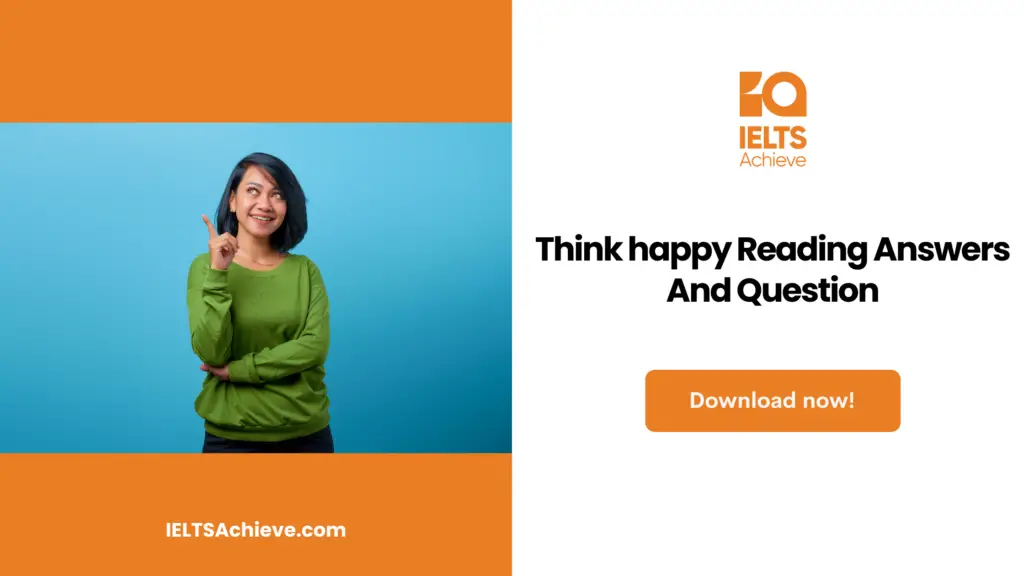The Blog post contains the following IELTS Reading Questions:
- IELTS Reading Locating Information
- IELTS Reading Note Completion
- IELTS Reading Summary Completion
Stay informed and prepared for success – Explore our comprehensive Reading Test Info page to get valuable insights, exam format details, and expert tips for mastering the IELTS Reading section.
IELTS Reading Passage – Think happy

Think happy
It’s no joke: even scientists at the Royal Society are now taking the search for the source of happiness very seriously.
What would Sir Isaac Newton have thought? There he was, painted in oils, seeing one of the most bizarre sessions ever conducted by the Royal Society, the most prestigious scientific organisation in Britain. If Newton had flashed a broad grin, it would have been quite fitting, considering a two-day conference was taking place underneath him last week on a burgeoning new scientific field: the research of what makes individuals happy. Distinguished academics approached the platform, one of which was an expert neurologist prepared with footage of ladies chuckling during comedy flicks, while another was a social scientist with data on national happiness. Hundreds of other researchers sat taking notes on how to boost the number of grins.
The Royal Society’s choice to choose “the science of wellbeing” from hundreds of other conference proposals is no laughing matter. In fact, the significance of this inquiry into what makes individuals happy is taken quite seriously. Dr. Nick Baylis, a psychologist at Cambridge University and one of the conference organisers, said, ‘Many philosophies and faiths have addressed this topic, but it has been disregarded by science,’ The Royal Society’s endorsement is crucial because it demonstrates that what we are doing deserves to be recognized and explored by the brightest brains in research.
At first appearance, Baylis’s objective, as well as that of an increasing number of other scientists engaged in happiness research, looks ridiculous. They aim to use scientifically rigorous methods to understand why some individuals are perpetually happy while others tend to be miserable. Then, they want to disseminate the happiness secret around the world and, in essence, increase the total amount of human happiness. ‘If someone is happy, they are more well-liked, healthier, live longer, and are more productive at work. Therefore, it is quite valuable,’ he says.
Baylis, the only ‘positive psychology’ instructor in Britain, is very aware that the goals of happiness research may seem vague, so he makes every effort to distinguish himself from the hordes of non-academic self-help gurus. He emphasises ‘life satisfaction’ and ‘wellbeing’ and reinforces that his work, as well as the work of others at the conference, is based on solid research. So what researchers have found? – Is there a theory of happiness?
According to Professor Martin Seligman, the world’s foremost expert on this subject, happiness is just a commute and a few questionnaires away. A Pennsylvania University psychologist, Seligman, initiated the happiness research movement with a lecture he delivered as president of the American Psychological Association (APA). Frightening delegates at the APA convention, Why, said Saligman, does science just study suffering? Rather than focusing solely on pain control, why not investigate what actions boost happiness, even among individuals who are not depressed? The lecture may have ended the career of a lesser-known scientist, but Seligman secured over £18 million in funding to pursue his hypothesis. He has been in constant communication with hundreds of other scholars and practising psychologists from across the globe, conducting surveys and developing ways for enhancing happiness.
After his findings, he believed that there are three main types of happiness. Firstly, there is “the pleasant life” — the kind of satisfaction we often get from physical pleasures like eating, drinking, and watching a good movie. According to Seligman, Hollywood and the commercial industry have erroneously convinced the rest of us to assume that this is the way to achieve lifelong pleasure. And the second type is, ‘the good life’, which consists of enjoying what we are good or talented at. The trick is to recognise our abilities and then engage in an activity that utilises them, Seligman argues. Thirdly, ‘meaningful life’. According to Seligman, the key to sustainable pleasure is finding something you believe in and putting your abilities to work for it. Thus, those who are adept at interacting with others may find permanent satisfaction via politics or volunteer work, but a rock star who wants to change the world may find it by organising a charity event.
According to Seligman, attaining “the good life” and “the meaningful life” is the key to long-term happiness. He provides a fascinating suggestion for those confused about how to continue. He says that you need a pen, some paper, and depending on your location, a train ticket to go on the road to happiness. First, acknowledge a person to whom you owe a great debt of appreciation but who you have never properly acknowledged. After that, compose a 300-word essay detailing the significance of the assistance and your appreciation. Then, inform them that you must make a visit, without specifying why, and present the essay to them at their home. Apparently, the outcome was tears, embraces, and a more deep, longer-lasting pleasure than champagne could produce.
Some sceptics may argue that science will always be a crude method of exploring and promoting happiness, and that such matters are best handled by artists, authors, and musicians if they can ever be managed. Furthermore, not everyone at the meeting was enthusiastic about the new research. Professor of biology as applied to medicine at University College London Lewis Wolpert, who has authored a best-selling book on his struggle with depression, said, ‘If you were happy, I’d be very suspicious. I believe you would do nothing except sit there in a sticky state of bliss. There is a vast universe out there, and until you experience a little difficulty, you will never really acquire anything.
Unlock your full potential in the IELTS Reading section – Visit our IELTS Reading Practice Question Answer page now!
Recommended Questions:
Renewable Energy IELTS Reading Question with Answer
Think Happy IELTS Reading Questions
Questions 1-4
Which paragraph contains the following information? Write the correct letter A-H in your answer sheet.
- a remark addressing the potential effects of expressing a certain viewpoint in public.
- a reference to the possible broader effects of happiness-related studies.
- a belief that achieving perfect happiness may not be desired.
- the significance of the fact that the meeting was convened at all.
Questions 5-8
Complete the sentences below with words taken from Reading Passage. Use NO MORE THAN THREE WORDS for each answer.
5. At the conference, research into happiness was referred to as the ________
6. Baylis and others intend to use ________ to find out what makes people happy or unhappy.
7. Baylis gives classes on the subject of ________
8. Baylis says he should not be categorised among the ________ who do not have academic credentials.
Enhance your sentence completion skills in the IELTS Reading section. Click here to access our comprehensive guide and learn effective strategies for filling in missing words or phrases in sentences.
Questions 9-14
Complete the summary below using words from the box. Write your answers in your answer sheet.
Seligman’s categories of happiness
Seligman’s first type of happiness involves the enjoyment of pleasures such as 9. ______entertainment. He believes that individuals should not be under 10. ______ illusion that such things lead to happiness that is not just temporary. His second type is related to 11. ______ ability. Identification of this should lead to 12. ______ participation and the result is ‘the good life’. His third type involves having a strong 13. ______ conviction and doing something about it for the benefit of others. This, according to Seligman, leads to happiness that has some 14. ______ permanence.
| incentive | confidence | leadership | entertainment |
| illusion | thrill | effort | perseverance |
| celebration | ability | participation | theory |
| leadership | ego | encouragement | permanence |
| conviction | exaggeration | support | concept |
Boost your performance in Summary, Notes, Table, and Flowchart Completion tasks. Click here to explore our detailed guide and learn how to effectively complete summaries, notes, tables, and flowcharts in the IELTS Reading section.
Unlock your full potential in the IELTS Reading section – Visit our IELTS Reading Practice Question Answer page now!
Recommended Questions:
Renewable Energy IELTS Reading Question with Answer
Think happy reading answers
1. E
2. C
3. H
4. B
5. science of well-being
6. scientific rigorous methods
7. positive psychology
8. self-help gurus
9. entertainment
10. illusion
11. ability
12. participation
13. conviction
14. permanence

We hope you found this post useful in helping you to study for the IELTS Test. If you have any questions please let us know in the comments below or on the Facebook page.
The best way to keep up to date with posts like this is to like us on Facebook, then follow us on Instagram and Pinterest. If you need help preparing for the IELTS Test, join the IELTS Achieve Academy and see how we can assist you to achieve your desired band score. We offer an essay correction service, mock exams and online courses.

